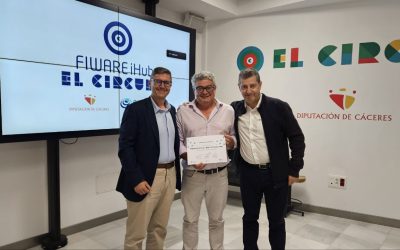The BeOpen project has successfully empowered cities across Europe to leverage High-Value Datasets (HVDs) and innovative digital services, addressing critical urban challenges from natural disasters to road infrastructure and public health. Through a series of impactful pilots, BeOpen has demonstrated the transformative power of data-driven decision-making, fostering collaboration, enhancing data accessibility, and improving citizen well-being.
A New Era of Urban Resilience and Efficiency
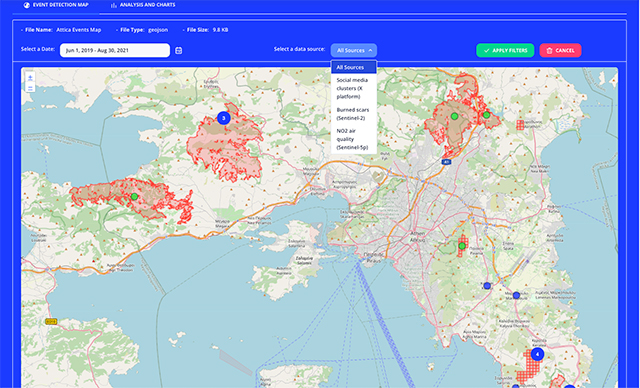
Attica: A Shield Against Wildfires
Attica, a region highly vulnerable to wildfires, faced the challenge of static risk assessments and minimal public involvement in monitoring. BeOpen introduced a paradigm shift by utilizing crowdsourced technology and social media content for near real-time fire detection. This digital service, integrating historical fire data, social media posts and events, EFFIS data, and Copernicus Satellite data, achieved significant improvements in data quality (scores from 34-39% to 85-90%).
The fusion of social media and NO2 data proved crucial, reducing false alarms and enabling early fire alerts. As a result, Attica transitioned from static to dynamic risk assessment and from centralized to citizen-driven monitoring, improving responsiveness and resource allocation for firefighting efforts. Key lessons learned emphasized the criticality of co-design with end-users and the importance of diversified data acquisition strategies.
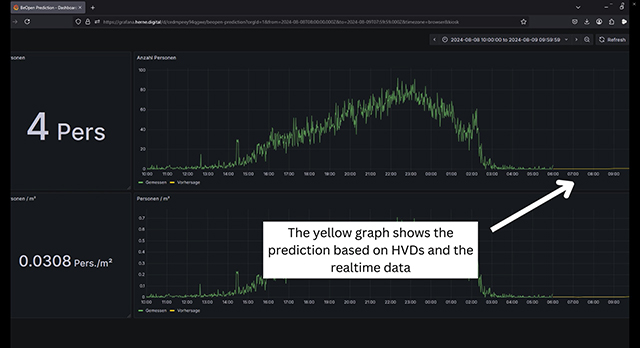
Herne: Smarter Roads and Safer Events
Herne, a city with an extensive road network, battled inefficient traditional maintenance methods and a lack of real-time data, leading to delayed repairs and high costs. BeOpen’s Smart Road Condition Management System (SRCMS) employed AI and real-time data collection from vehicles equipped with cameras and sensors. This enabled real-time detection and classification of road damage, drastically improving road condition data scores from 22% to 100%.
The BeOpen portal facilitated data quality, interoperability, and broader sharing. Herne also tackled the challenge of managing large-scale events like the Cranger Kirmes fair, where recognizing dangerous situations often came too late. By collecting real-time data from radar sensors, app-based parking occupancy, and Edge AI cameras for people density, BeOpen supported authorities in assessing security situations and forecasting crowd movements, achieving 100% scores in people density, road traffic, and parking lot occupancy data. This proactive approach ensures safer events and more efficient urban management.

Porto: Strengthening Flood Preparedness
Porto grappled with significant flood risks and a reliance on external, often non-real-time, data for emergency response. BeOpen addressed this by developing a Machine Learning AI model to forecast floods and a real-time visualization dashboard for alerts and resource localization. This initiative integrated diverse datasets, including observed meteorology, traffic management system data, and police/ firefighter geolocation.
The project significantly increased data usage (55% of respondents used geospatial data extensively post-project) and data quality (CCTVs, observed meteorology, POIs, trees, and classified trees all reached 100% HVD scores from baselines of 0-70%). Stakeholder feedback confirmed a 100% reported benefit, with 60% perceiving significant improvements in data quality and accessibility. The project fostered a stronger institutional commitment to open data (90% reported “strong commitment”) and expanded dataset availability, positioning Porto for data-driven decision-making in urban flood emergencies and future digital twin technologies.
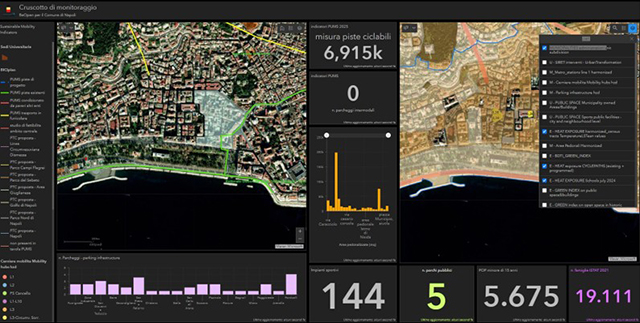
Napoli: Systematizing Mobility and Green Capital Data
Napoli faced challenges due to the lack of shared mobility data and the need for improved distribution of Earth observation data for public space and green capital evaluation. BeOpen facilitated the standardization, hosting, and metadata checking of datasets, integrating them into a web maps and monitoring dashboard. This innovative approach demonstrated the value of HVDs in the sustainable mobility domain (e.g., cycle paths, mobility hubs) and Earth observation (e.g., soil temperature, green adaptation opportunities).
The project significantly improved the systematization of mobility data and enhanced the municipality’s awareness of EU-compliant data pipelines, fostering a solid network of officers managing data and producing thematic information.
Enhancing Urban Security, Health, and Environment
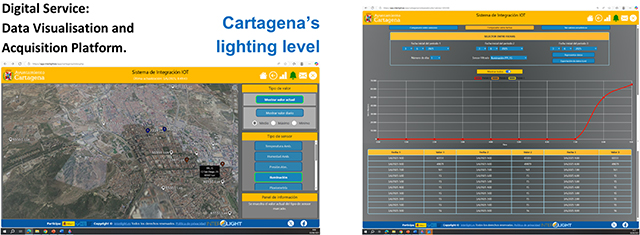
Cartagena, Molina de Segura, Torre Pacheco: Integrated Urban Solutions
The three Spanish pilots tackled multifaceted urban challenges, demonstrating the versatility of the BeOpen framework across three key areas:
- Urban Security in Historic City Centers: These cities aimed to enhance traffic management and urban security in high-density areas. Digital services were developed to integrate air quality, noise levels, crowd monitoring, and traffic data, all published via BeOpen CKAN. This shifted the approach from reactive incident response to a data-informed prevention model, enabling real-time risk monitoring. Data quality for all integrated datasets reached 100% from baselines of 30-40%. 100% of respondents reported benefit, with 80% citing a significant impact, and 90% noting expanded dataset availability.
- Sustainable LED Lighting and Health Impact: The goal was to optimize LED street lighting for energy efficiency, improved visibility, and public health protection from blue light exposure. BeOpen supported the development of a digital service visualizing geolocated LED infrastructure, energy consumption, and intensity levels. While still evolving, the pilot facilitated data-informed selection of lighting zones and types (e.g., LOGICA LEDs with no blue light emission), aiming for energy savings and health-conscious urban design. Baseline scores for city luminosity and energy consumption were at 20% and improved to 100% HVD.
- Climate Change Mitigation: Urban Heat Islands and Heatwaves: Addressing extreme heat events, the cities developed a digital service providing real-time, publicly accessible maps of temperature and environmental conditions, integrating air quality, humidity, and temperature data (all reaching 100% HVD scores). This enabled heat-prone zone visualization, supported municipal planning, and encouraged citizen awareness. The focus shifted climate adaptation from strategy to actionable data use, fostering a collaborative ecosystem for climate action.

Vilnius: Battling Invasive Species
Vilnius, the European Green Capital 2025, faced the challenge of combating Sosnowski’s hogweed, an invasive and phototoxic plant, with limited human resources for detection and monitoring. BeOpen’s solution involved creating a dataset from drone images and AI to identify invasive species polygons and project their expansion using wind data.
This digital service enabled editable maps for municipal workers, automatic calculation of affected areas, and more detailed attributes with standardized names. HVDs like “Natural framework,” “Intensively used green spaces,” and “Green space accessibility” were improved, and new datasets like “Invasive species (ML)” were created. This data-driven approach significantly improved resource allocation and planning for invasive plant eradication, demonstrating the power of AI and open data in environmental protection.
Overall Impact of BeOpen
Across all pilot projects, BeOpen has consistently delivered on its promise:
- Increased Data Accessibility and Quality: HVDs were significantly improved and made accessible through platforms like BeOpen CKAN and national/European data portals.
- Enhanced Data-Driven Decision-Making: Cities moved from reactive or traditional methods to proactive, data-informed strategies across various domains. Stronger Stakeholder
- Engagement and Collaboration: Early and continuous involvement of diverse stakeholders, from civil protection authorities to citizens, proved crucial for successful adoption and increased satisfaction.
- Improved Efficiency and Responsiveness: Real-time data integration and digital services led to quicker responses to incidents, more efficient resource allocation, and better urban planning.
- High Replicability Potential: The BeOpen framework and developed digital services are highly replicable, offering a blueprint for other cities to address similar challenges and foster digital transformation.
The BeOpen project has not only delivered tangible improvements in participating cities but has also laid a robust foundation for future data-driven urban development across Europe, proving that open data is key to building smarter, safer, and more sustainable cities.
The Role of FIWARE
FIWARE is a significant contributor to the BeOpen framework through its core components and adherence to key standards. The FIWARE Orion Context Broker is crucial for real-time context management, processing data from various sources using the NGSI model and standard. This central hub effectively stores, updates, and notifies changes in smart applications, ensuring that data and metadata comply with the ETSI NGSI-LD standard, which is vital for data interoperability.
The Data Model Mapper, a tool within BeOpen, integrates with the Orion Context Broker to send structured context data, facilitating real-time updates and consistent semantic context management. Additionally, FIWARE Draco, built on Apache NiFi, is used for data flow and persistence. It handles the ingestion, transformation, and routing of context data from Orion to storage systems, enabling scalable ETL processes and ensuring a continuous and efficient flow of information, including real-time updates and historical data.
The BeOpen framework’s adoption of the ETSI NGSI-LD API is fundamental for smart city and IoT solutions, as it supports semantic modeling and dynamic information management. The Data Model Mapper’s automatic storage of harmonized data in the FIWARE Orion Context Broker reinforces this compliance. Furthermore, BeOpen actively supports the European Smart Data Models initiative, promoting standardized data models to enhance interoperability and information sharing. This involvement aligns BeOpen with advanced data management standards and fosters collaboration among diverse entities.


